Emergency Dentist – Colorado Springs
In Pain? Need Help? Call Us!

For most people, their first instinct in a dental emergency is to head to their local emergency room, but they’ll most likely just spend hours in the waiting room before they’re actually seen. Instead, people in Colorado Springs who are in need of urgent dental care should simply call Anderson Family Dental by Espire. We have the training and equipment most ERs don’t have, allowing us to handle pressing dental issues. We’ll also be able to see you much, much faster. In many cases, we can even schedule a same-day appointment for an emergency patient to provide immediate relief.
Why Choose Anderson Family Dental by Espire for Emergency Dentistry?
- Same-Day Appointments for Emergency Patients
- Highly Trained Team of Dental Experts
- Kind, Compassionate, & Friendly Office
How We Treat Dental Emergencies
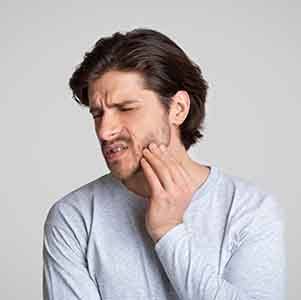
When you turn to us for emergency dental care, we’ll follow these four basic steps to help you achieve the relief you deserve:
- Same-Day Appointment: Time is of the essence in a dental emergency, so we’ll schedule a visit for you as soon as we can. While you’re on the phone, we can give you any first-aid advice that you need.
- Emergency Exam: During an emergency appointment, we’ll prioritize stopping your pain and identifying the underlying source of the issue. A thorough examination of your teeth and gums will be completed, and X-rays might be taken.
- Review Findings: We’ll share what we found during our examination and give you our recommendations for treatment. Rest assured that an estimate of the cost and the length of the treatment will be provided.
- Get the Care You Need: Once we have a treatment plan, all that’s left is to carry it out in order to restore the health of your grin!
The Most Common Dental Emergencies
Dental emergencies can come in all shapes and sizes. Below, you’ll find some examples of dental problems that may warrant an emergency appointment. Even if you’re not sure that your issue counts as a dental emergency, it’s generally best to call our office anyway; our team can help you figure out the best next steps to take to protect your smile.
Understanding the Cost of Dental Emergencies

We care about making sure that you can have emergency dental treatment performed when you need it without having to worry about your bank account. As such, we will always be transparent regarding the cost of whatever services are needed to repair your smile and stop your dental pain. Dental insurance, CareCredit financing, and our membership plan can all make paying for emergency dental care easier; don’t hesitate to ask us about these payment options.
How to Prevent Dental Emergencies

As your “emergency dentist near me,” our team is always eager to help you out when you encounter an urgent oral health problem. However, we are sure you would prefer to avoid such situations in the first place! How can you do that? Below, we outline some best practices that will help you reduce your risk.
Do Not Skip Dental Visits
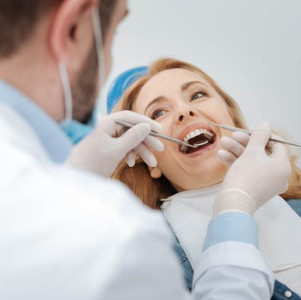
Make it your practice to visit your dentist twice a year for a cleaning and checkup. At these appointments, our team has the opportunity to diagnose oral health issues while they are still in their early stages, long before they lead to an emergency situation. Thorough cleanings can remove dangerous plaque and tartar that might otherwise cause decay. We can also provide personalized guidance to help you keep your smile healthy from day to day.
Take Excellent Care of Your Smile at Home

Good daily habits can go a long way toward preventing decay and gum disease. You should:
- Brush your teeth every morning and evening with a soft brush and fluoridated toothpaste. Do not forget the backs of your teeth or the area along your gumline.
- Floss at least once a day. If flossing is challenging for you, you might try a water flosser instead.
- Drink plenty of water.
- Use a mouthwash (ask our dental team for product recommendations.
Choose Your Foods Carefully

Poor eating habits can increase your risk of cavities, weakened enamel, and broken teeth. Here are some tips for choosing foods widely:
- Try to enjoy sugary and acidic treats only in moderation.
- Be sure to consume enough calcium, vitamin D, and vitamin C.
- Be very cautious when eating foods with hard parts, like bone-in meats and popcorn.
- Make water your beverage of choice; soda, sports drinks, and alcohol should be consumed rarely (if you choose to consume them at all).
Wear a Mouthguard
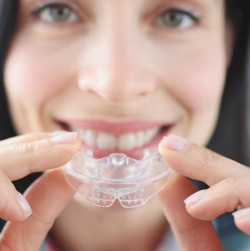
There are two different types of mouthguards that may help to prevent a dental emergency.
If you tend to grind your teeth at night, you may need a nightguard to place a protective barrier between your upper and lower arches. If you play sports, a sportsguard can reduce your risk of oral injuries. Remember that although you can buy over-the-counter mouthguards, custom products from a dentist are more effective and much more comfortable.
Do Not Use Your Teeth as Tools
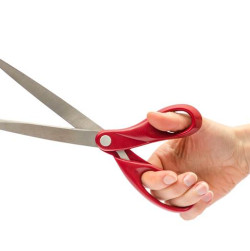
You might occasionally be tempted to use your teeth to open packages, trim your fingernails, or snip the tags off new clothing. That is not a wise practice! You could easily end up chipping or breaking a tooth. At the very least, you may prematurely wear down your enamel. Try carrying a small pocketknife or pair of scissors with you so you do not use your teeth for tasks that they are not designed for.
Root Canal Therapy
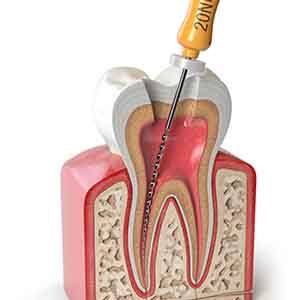
Root canal therapy is how we save teeth that have developed an infection within the dental pulp, which is the inner layer of a tooth where the delicate nerve is located. This kind of infection can cause quite a bit of pain, and this is why the procedure itself has such a bad reputation. In reality, root canal therapy is one of the best tools we have for relieving dental pain and saving severely damaged teeth from extraction. If you have a persistent toothache, it could be the exact solution you’re looking for!
Learn More About Root Canal Therapy
Tooth Extractions
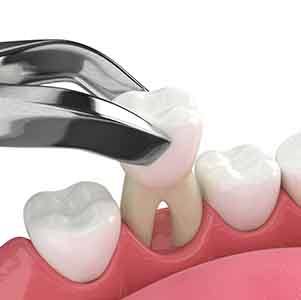
Our primary goal is to help our patients keep their natural teeth for as long as possible, but in certain situations, an extraction is simply unavoidable, such as when:
- A tooth is too decayed to be repaired with a filling or crown
- A tooth is too broken to be put back together
- Advanced gum disease has ruined the bone needed to hold a tooth in place.
Comfort is always one of our top priorities, so for our tooth extraction patients, Dr. Anderson uses a gentle touch and plenty of local anesthetic to ensure an easy and stress-free procedure.
Learn More About Tooth Extractions
Dental Emergency FAQs
Will a Toothache Go Away on Its Own?
Teeth are incapable of healing themselves, so it is not likely that your toothache will go away on its own. However, there are a few exceptions to the rule.
For example, the pain might be coming from near a tooth, rather than the tooth itself. Things like swollen sinuses or a small gum injury can feel like a toothache. As the issue heals, your mouth should start to feel better.
A toothache may also go away if the nerve inside the tooth dies. However, the infection that caused the original toothache could still be there and continue to cause damage.
How Should I Sleep with Tooth Pain?
Tooth pain can seem much worse at night! To help you sleep, there are a few things you can try:
- Prop your head up on a few pillows. Elevating it can prevent blood from rushing to the area around your tooth and worsening your pain.
- Take over-the-counter pain relievers to reduce discomfort and inflammation.
- Be careful about what you eat before bedtime. Do not consume anything hard, hot, cold, or acidic.
- Apply a cold compress. (Do not fall asleep while the cold compress is on your face. Simply apply it for 15 – 20 minutes as you are winding down for the evening.)
Will Pulling a Bad Tooth Stop the Pain?
When a tooth is extracted, the nerve inside it is also removed, meaning that it will no longer be able to send pain signals to your brain. For this reason, an extraction can be an effective way to permanently end a toothache.
However, keep in mind that an extraction is usually viewed as a last resort. Our team will strive to explore other means of relieving your pain while still preserving your tooth. For example, we might recommend that you undergo root canal therapy.
Should I Visit the Emergency Room First for Dental Emergencies?
If you believe your jaw is broken or dislocated, you are bleeding excessively, or have other life-threatening symptoms, you should certainly visit the local emergency room. You can see us later for follow-up care.
In almost all other instances, an emergency dentist in Colorado Springs should be your first stop for urgent dental treatment. Most emergency room personnel do not have the training or equipment to deal with issues like toothaches, infected teeth, and other common oral problems. They might be able to do little more than encourage you to visit a dentist.
If a Knocked-Out Tooth is Reattached, How Long Will It Take to Heal?
If we are able to splint your knocked-out tooth back into its socket, it will take a bit of time for it to re-bond with the surrounding tissue. In fact, the healing process typically takes four weeks or so. However, if your jawbone is damaged, it might be up to eight weeks before you are fully healed. You will need to be careful throughout your recovery period so you do not interfere with your body’s healing process. Our team will provide instructions to that end.
